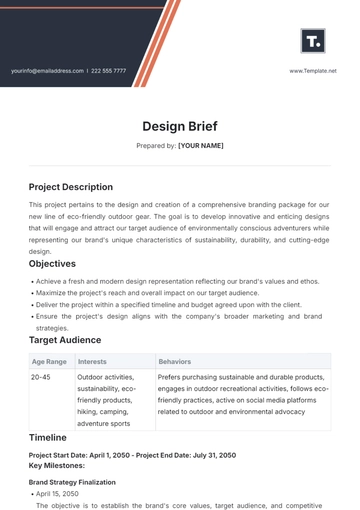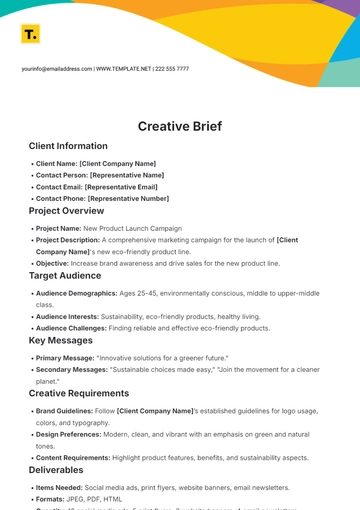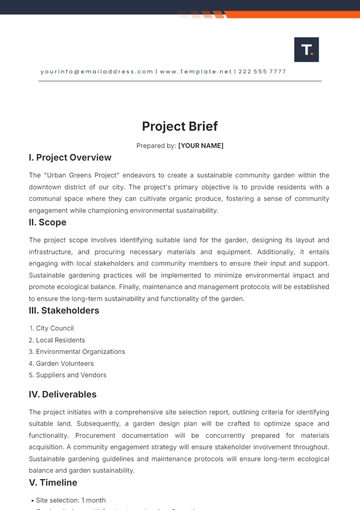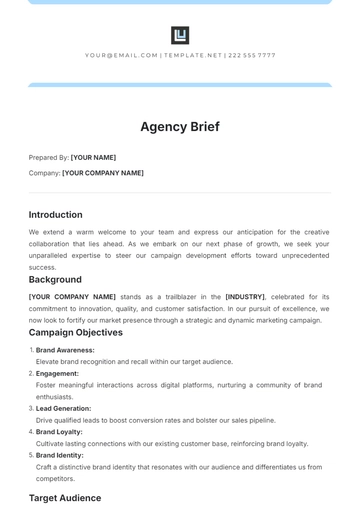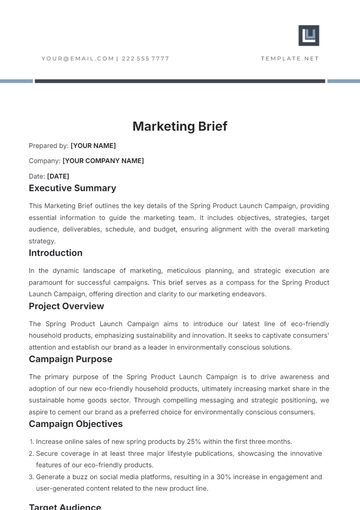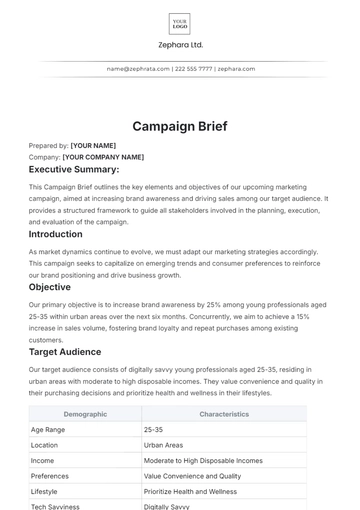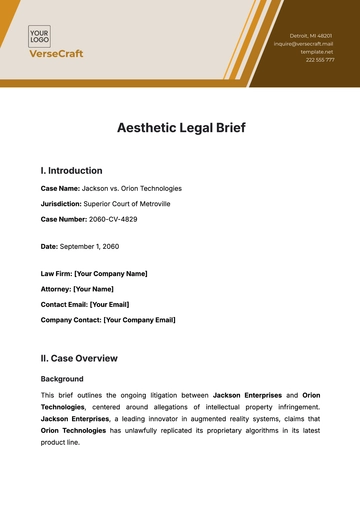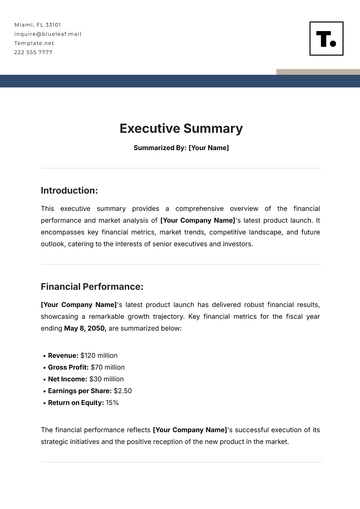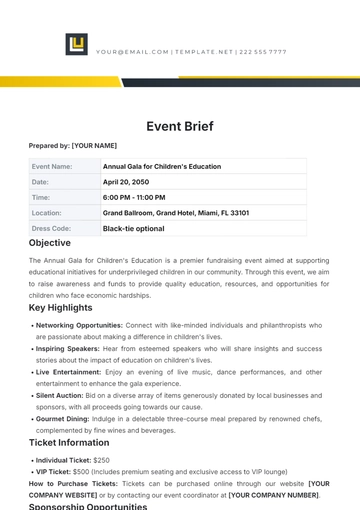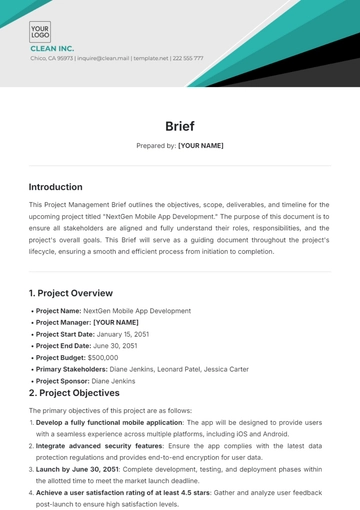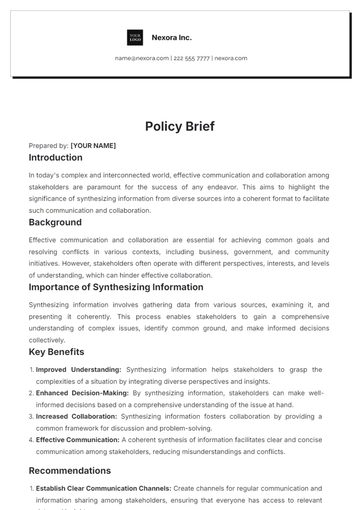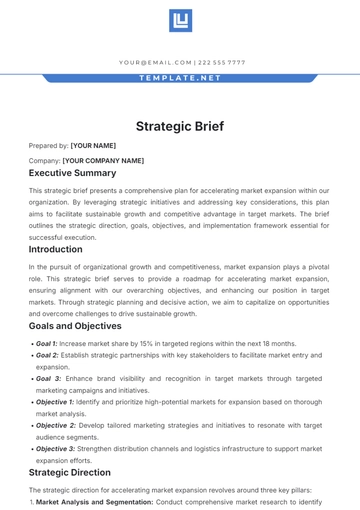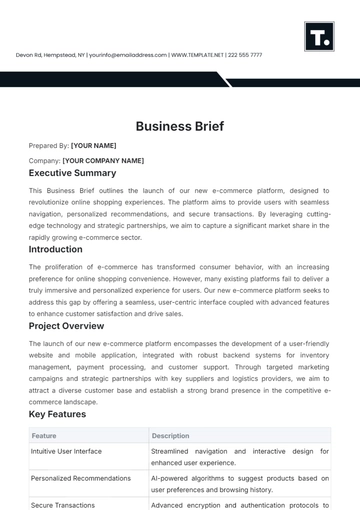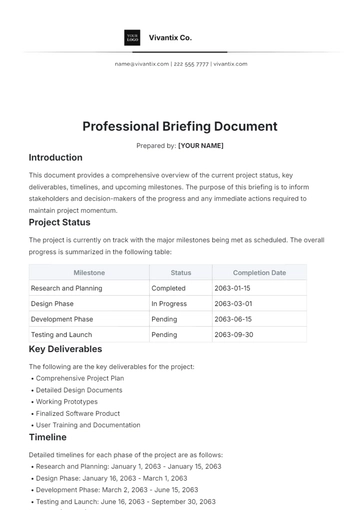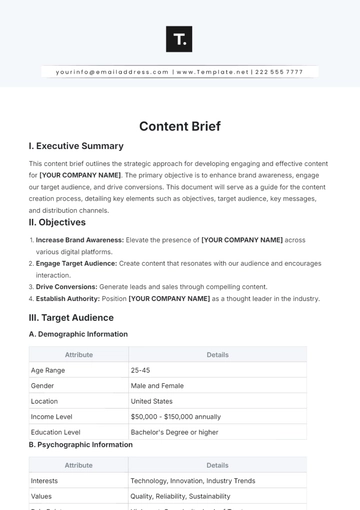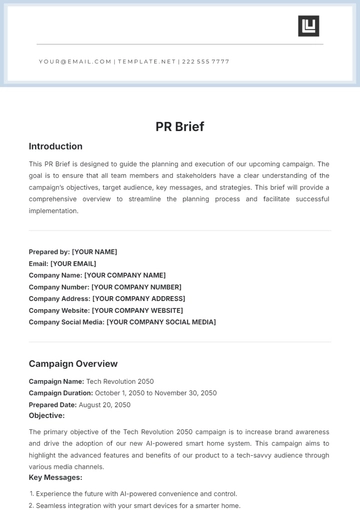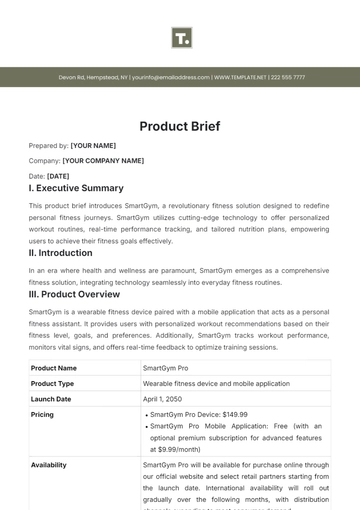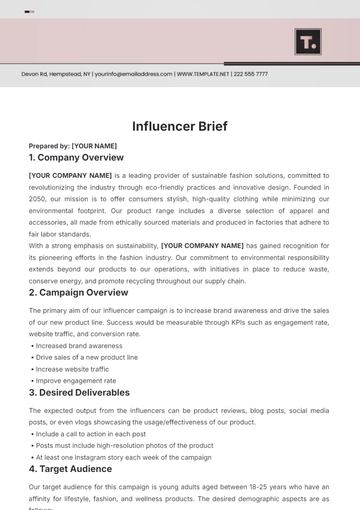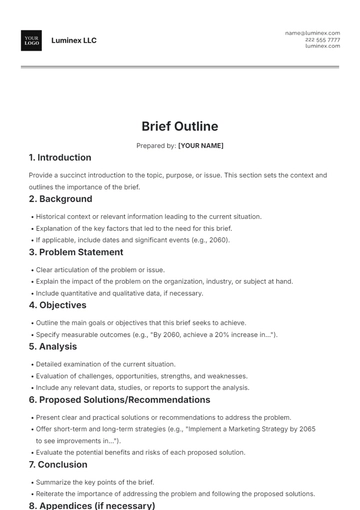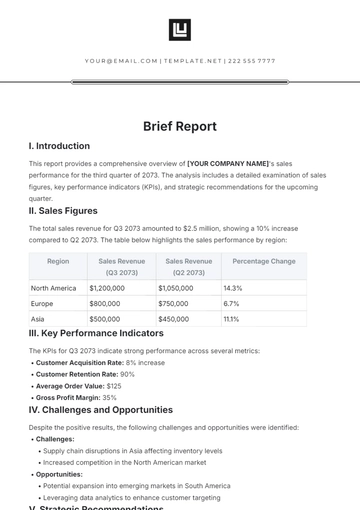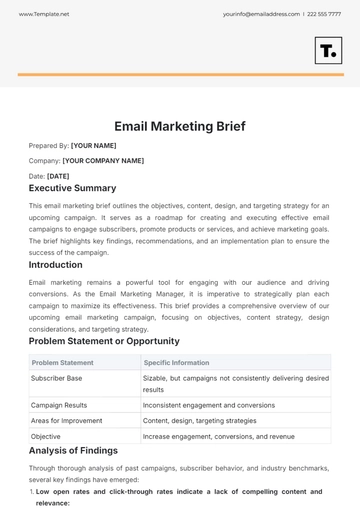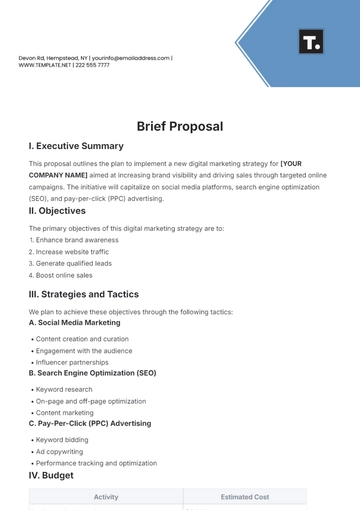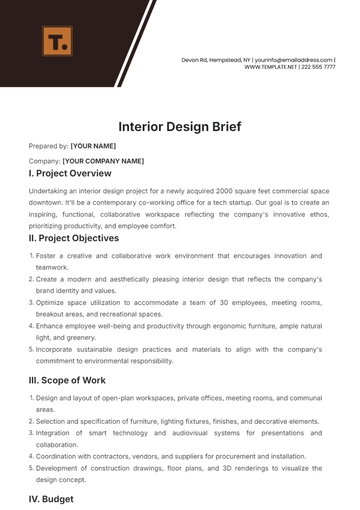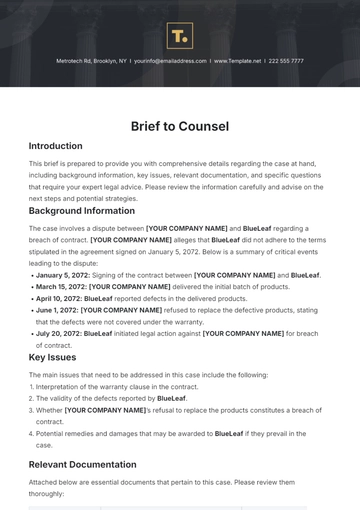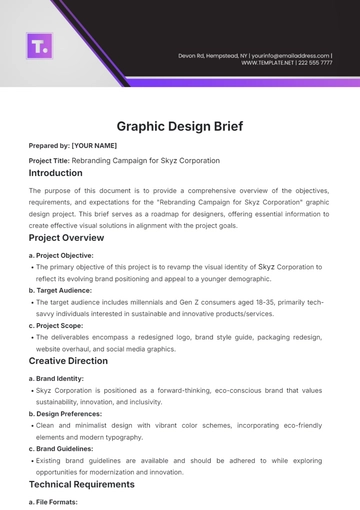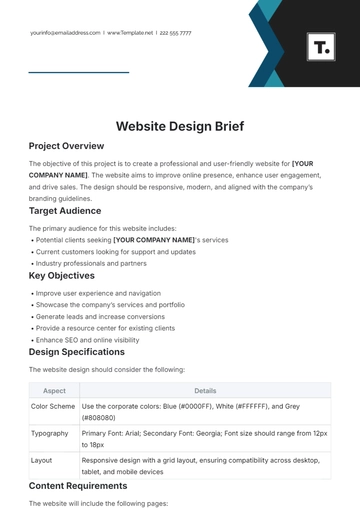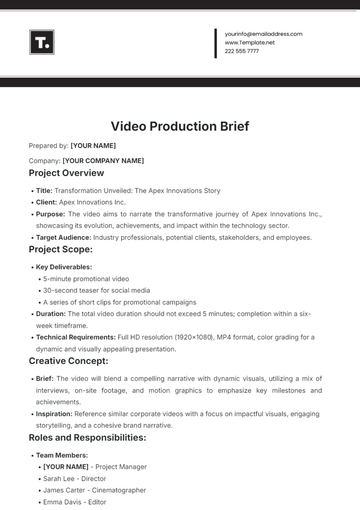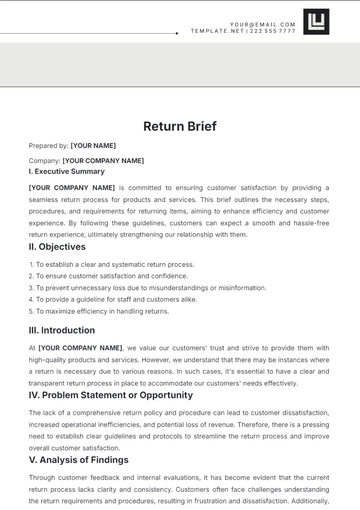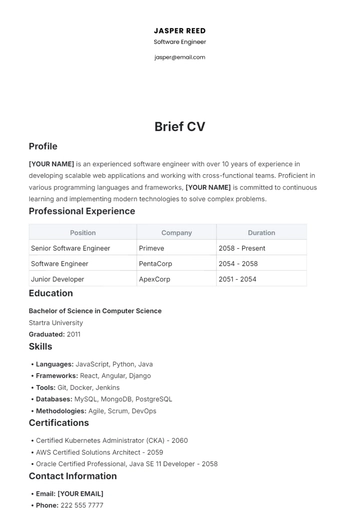Free Business Development Brief
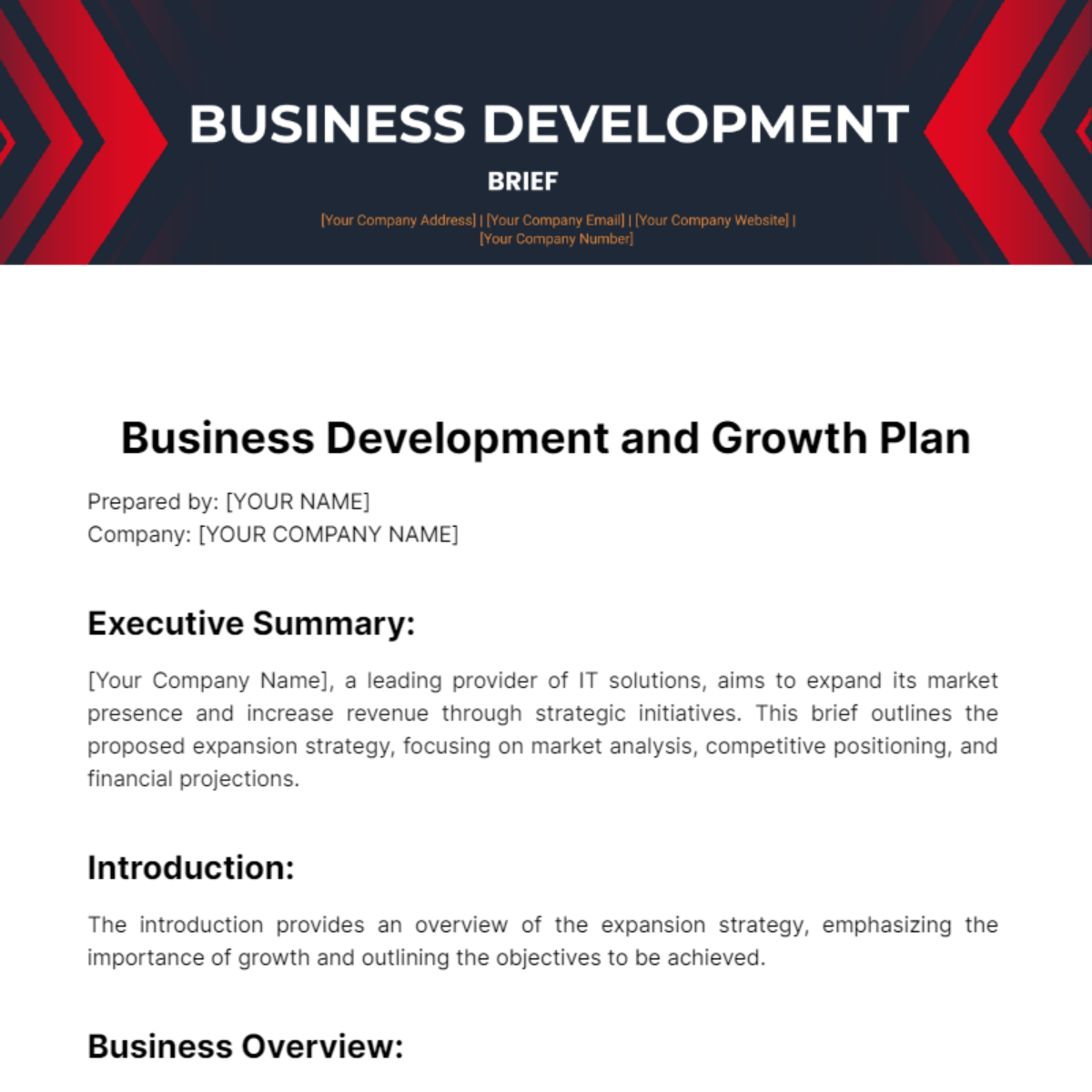
Prepared by: [YOUR NAME]
Company: [YOUR COMPANY NAME]
Executive Summary:
[Your Company Name], a leading provider of IT solutions, aims to expand its market presence and increase revenue through strategic initiatives. This brief outlines the proposed expansion strategy, focusing on market analysis, competitive positioning, and financial projections.
Introduction:
The introduction provides an overview of the expansion strategy, emphasizing the importance of growth and outlining the objectives to be achieved.
Business Overview:
[Your Company Name] specializes in providing software solutions to small and medium-sized businesses. With a focus on innovation and customer satisfaction, the company has established a strong reputation in the industry.
Market Analysis:
An analysis of the IT solutions market reveals a growing demand for cloud-based services and digital transformation solutions. [Your Company Name] aims to capitalize on these trends by offering cutting-edge products tailored to the needs of its target market.
Competitive Analysis:
Competitive analysis indicates that [Your Company Name] faces competition from both established players and new entrants in the market. However, the company's focus on quality, customer service, and innovation sets it apart from competitors.
SWOT Analysis:
[Your Company Name] strengths include its reputation for quality and innovation, while weaknesses include limited brand awareness in certain market segments. Growth opportunities lie in expanding into new geographic regions, while threats include increasing competition and economic uncertainty.
Business Development Strategy:
This table provides a clear overview of the strategic initiatives, objectives, action steps, timeline, and responsible parties involved in the business development strategy.
Strategic Initiative | Objective | Action Steps | Timeline | Responsible Party |
|---|---|---|---|---|
Geographic Expansion | Expand market presence into new regions | Conduct market research to identify target regions | Q2-Q3 2050 | Sales and Marketing Team |
Establish partnerships with local distributors | Q3-Q4 2050 | Business Development Manager | ||
Develop localized marketing campaigns | Q4 2050 | Marketing Team | ||
Product Diversification | Introduce new product lines to diversify offerings | Conduct market analysis to identify gaps and opportunities | Q2 2050 | Product Development Team |
Develop prototype products for testing | Q3 2050 | R&D Team | ||
Pilot launch new products in select markets | Q4 2050 | Sales Team | ||
Strategic Partnerships | Form strategic alliances to enhance market presence | Identify potential partners in complementary industries | Q2 2050 | Business Development Manager |
Negotiate partnership agreements | Q3-Q4 2050 | Legal and Business Development Team | ||
Collaborate on joint marketing initiatives | Q4 2050 | Marketing and Partner Organizations |
Financial Projections:
Financial projections indicate a significant increase in revenue and profitability over the next three years, driven by market expansion and product diversification. Investment requirements are outlined to support the implementation of the expansion strategy.
Conclusion:
In conclusion, the proposed expansion strategy positions [Your Company Name] for sustained growth and market leadership in the IT solutions industry. By leveraging its strengths and addressing key challenges, the company can capitalize on emerging opportunities and achieve its strategic objectives.
Recommendations:
Recommendations for implementing the expansion strategy include establishing clear goals and timelines, allocating resources effectively, and monitoring performance metrics closely. Continuous evaluation and adjustment of the strategy are essential to ensure its success.
Appendices:
In this example, Appendix A provides market research data for different market segments, including their size, growth rates, and key trends. Appendix B presents financial projections for the next three years, including revenue, profit margins, and investment requirements. Appendix C lists various supporting documentation that complements the business development brief, such as customer testimonials, partnership agreements, product brochures, and legal contracts.
Appendix A: Market Research Data
Market Segment | Market Size (USD) | Growth Rate (%) | Key Trends |
|---|---|---|---|
Small Businesses | $10 million | 8% | Adoption of cloud-based solutions |
Medium Businesses | $25 million | 12% | Demand for cybersecurity solutions |
Large Enterprises | $100 billion | 6% | Emphasis on digital transformation |
Appendix B: Financial Projections
Year | Revenue (USD) | Profit Margin (%) | Investment Required (USD) |
|---|---|---|---|
2024 | $5 million | 20% | $2 million |
2025 | $7 million | 22% | $2.5 million |
2026 | $9 million | 25% | $3 million |
Appendix C: Supporting Documentation
Customer Testimonials
Partnership Agreements
Product Brochures
Legal Contracts
This table provides a clear overview of the strategic initiatives, objectives, action steps, timeline, and responsible parties involved in the business development strategy. It helps in organizing and tracking the implementation of various initiatives to ensure alignment with the overall business goals.
- 100% Customizable, free editor
- Access 1 Million+ Templates, photo’s & graphics
- Download or share as a template
- Click and replace photos, graphics, text, backgrounds
- Resize, crop, AI write & more
- Access advanced editor
Introducing the Business Development Brief Template from Template.net. Crafted for efficiency, it's not just a template; it's a game-changer. Fully editable and customizable, it streamlines your strategy sessions effortlessly. Need more? It's editable in our AI Editor too, ensuring seamless integration with your workflow. Elevate your business approach today with this versatile tool.
